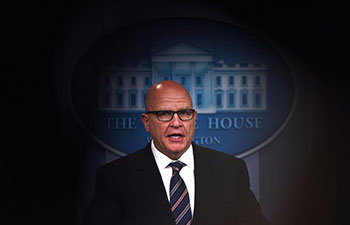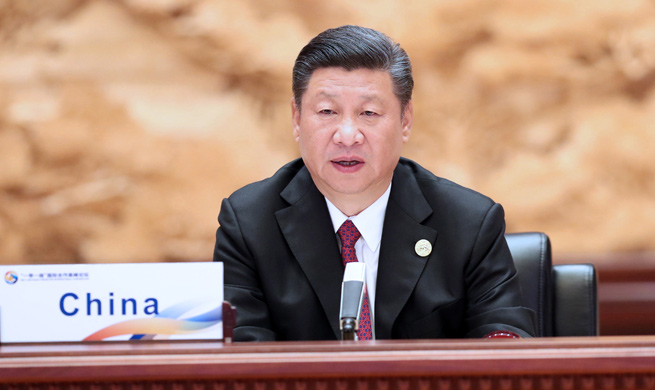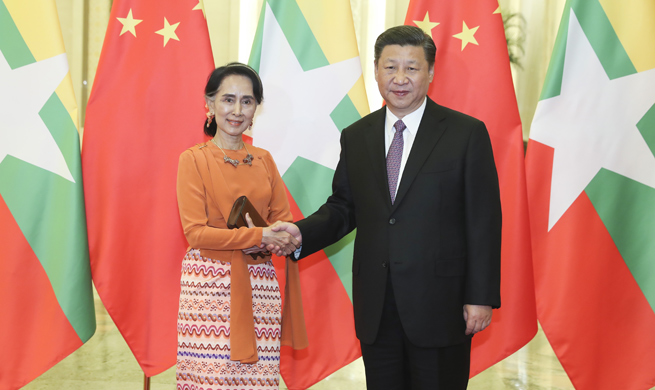TOKYO, May 17 (Xinhua) -- Japan's opposition parties on Wednesday submitted a no-confidence motion in the justice minister to the lower house of parliament and in doing so delayed the passage of a controversial anti-terror conspiracy bill that Prime Minister Shinzo Abe's government is ardently trying to force into law.
The no-confidence motion against Justice Minister Katsutoshi Kaneda, which has been brought by the main opposition Democratic Party along with three smaller parties, takes aim directly at Kaneda who they have been lambasting for his mishandling of debate on the issue.
According to the no-confidence motion, Kaneda, who is in charge of deliberations on the bill in parliament, has "continued to display behavior unbecoming of a cabinet minister, having been unable to answer even basic questions, such as whether ordinary people will be targeted by this bill."
Opposition parties also fundamentally maintain that the bill remains a danger to the privacy of ordinary citizens and could unjustly punish civic groups and labor unions.
Nevertheless, it has been approved by Abe's cabinet and has the backing of his ruling Liberal Democratic Party-led bloc.
They believe that when it comes into effect, it will be able to tackle what Abe has described could be potential terrorist threats on Japanese soil associated with the hosting of the 2020 Tokyo Olympics and Paralympics here.
The ruling coalition is hoping to get the contentious bill enacted after debate in both chambers of parliament by the end of the current parliamentary session on June 18, and Kaneda has told the press he wants to continue in his role, despite being admonished by the opposition camp.
Nevertheless, opposition party heads have stated that the mere semantic changes made to the final draft of the bill -- that itself has been rewritten numerous times -- are not enough for them to sign off on its passage through the lower chamber.
They have collectively voiced concern that the state would be allowed unprecedented powers of surveillance and could persecute civic groups without unequivocal justification, if the bill becomes law.
In the latest iteration of the bill, which is aimed at amending the law on organized crime, informed sources said recently the charge of conspiracy has simply been reworded as "planning terrorism and similar acts." Versions that have since been scrapped applied to "broader" groups.
The contentious bill also proposes punishing crimes in connection with the expansion of illegal activities of organized crime groups and covers 277 possible offenses spanning systematic killings, drug crimes and hijacking.
Those caught plotting one of the crimes could face up to five years in prison if the crimes they are planning carry the death penalty.
This prison sentence will also be applied if the crimes planned carry a jail sentence of 10 years or more, according to the bill.
The government maintains that the bill is needed to protect against potential acts of terrorism that may occur during the Olympics in Tokyo, with Abe's administration claiming that the latest version of the bill is less invasive than previous versions that were submitted and failed.
But opposition parties, lawyers and civic groups have voiced major concerns that the bill will lead to the government being allowed to invade the privacy of ordinary citizens and unjustly punish civic groups and labor unions and in doing so possibly infringe on human rights.
The main opposition Democratic Party and three smaller allied parties that filed the no-confidence motion Wednesday said the minor semantic revisions made to the updated bill do little to quash fears that investigative authorities could be granted arbitrary powers of search by the government.
The Democratic Party blasted the bill during its first task-force meeting on the issue last month with the party's Diet affairs chief Kazunori Yamanoi stating that the party must raise a great national uproar over the bill and attack Kaneda in thorough deliberations on the issue.
All four major opposition parties are united in killing the bill and have vowed not to allow it to pass through parliament and into law, stating that the bill was no different to former iterations submitted to parliament that were subsequently scrapped.
They previously claimed that the bill will erode the integrity of the criminal code in Japan by allowing people to be charged in connections with crimes that have not been committed.
Opponents to the legislation also believe that the scope of the bill is not limited to terrorist groups and could be applied in an arbitrary manner by law enforcement personnel, despite the government's arguments to the contrary.
The latest draft of the controversial bill states that the charge of conspiracy will be applied to organized crime groups with the punishments being levied at groups of two or more people.
Punishments will follow in cases where at least one member has secured funds for their activities or been involved in reconnaissance activities regarding a target location, the bill also states.
The Japan Federation of Bar Associations stated previously that the bill is ambiguous in its scope and its vagueness regarding the definition of terrorist organizations and crime groups could lead to the undue punishment of innocent civilians and groups.
Civic groups and individual protesters have been taking to the streets with large groups gathering in Tokyo in front of the Diet building and outside the prime minister's office, holding banners and shouting slogans claiming the bill will serve to squash any groups that stand opposed to the government and that the bill is undemocratic.
Protesters have also said the bill could take away people's civil rights, is in violation of the constitution and could be the next example of Abe's administration abusing its majority in parliament to pass laws unilaterally, as was the case with the highly-contentious security laws.
While Abe's ruling bloc will almost certainly use its majority to shoot down Wednesday's no-confidence motion, the bill being put in front of a committee vote will take place on Friday at the earliest and its passage through the lower house could be pushed back until next Tuesday as the opposition camp redouble their efforts to block its passage at every stage.

















